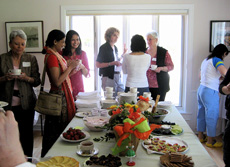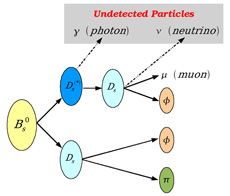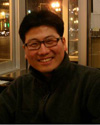|
Thursday, May 8
1 p.m.
Physics and Detector Seminar - West Wing, WH-10NW
Speaker: C. Adolphsen, Stanford Linear Accelerator Center
Title: SCRF for the ILC
2:30 p.m.
Theoretical Physics Seminar - Curia II
Speaker: T. Figy, Durham University
Title: QCD Corrections to Vector-Boson-Fusion Higgs Production Channels
3:30 p.m.
DIRECTOR'S COFFEE BREAK - 2nd Flr X-Over
THERE WILL BE NO ACCELERATOR PHYSICS AND TECHNOLOGY SEMINAR TODAY
Friday, May 9
3:30 p.m.
DIRECTOR'S COFFEE BREAK - 2nd Flr X-Over
4 p.m.
Joint Experimental-Theoretical Physics Seminar - One West
Speaker: A. de Gouvea, Northwestern University
Title: NuSOnG: Looking for Heavy and Light New Physics in High-Energy Neutrino Scattering
8 p.m.
Fermilab Lecture Series - Ramsey Auditorium
Tickets: $5
Speaker: Dr. Christian Butzke, Purdue University
Title: Wine Mythbusters: Elucidating the Science of Wine
Click here for NALCAL,
a weekly calendar with links to additional information.
|
Thursday, May 9
- Tomato Florentine
- *Pork BBQ sandwich
- Olive & artichoke paella
- Smart cuisine: chicken Marsala
- Smoked turkey melt
- Assorted slice pizza
- SW chicken salad w/roasted corn salsa
Wilson Hall Cafe menu |
|
Thursday, May 8
Dinner
- Closed
Wednesday, May 14
Lunch
- Stuffed filet of sole
- Lemon grass rice
- Spring vegetables
- Rhubarb & apple turnover
Chez Leon menu
Call x4598 to make your reservation. |
|
|
Layoff information
Layoffs at Fermilab will not go forward any earlier than the week of May 19. Currently, Fermilab is providing information to DOE for final approval of the Workforce Restructuring Plan. Given the retirements and resignations in recent weeks, the expected number of layoffs is about 140.
|
Tevatron experiments reach record luminosities
The Accelerator Division helped DZero and CDF set a trio of luminosity-related records this week.
On Monday, both the CDF and DZero experiments reported that they had surpassed 4 inverse femtobarns of integrated luminosity since the beginning of Run II.
"That number is enough to perform highest precision studies of the Standard Model and opens wide opportunities to discover physics effects beyond known today" said DZero co-spokesperson Dmitri Denisov. "It is about 100 times more than what was needed to discover the top quark."
Both experiments reported the results on Monday at the All Experimenter's Meeting.
"The Accelerator Division has achieved what many people never thought was achievable two years ago," said CDF co-spokesperson Rob Roser. "We're on our way."
If the Tevatron runs through 2010, scientists hope to reach 8 inverse femtobarns.
DZero scientists also reported a daily record of 10.4 inverse picobarns delivered Monday. The previous record, established on March 12, was 8.9 inverse picobarns. DZero scientists were able to record 95 percent, or 9.8 inverse picobarns, of Monday's data.
"That's really the best we can do," said DZero collaborator Bill Lee. "We had a great day Monday."
-- Rhianna Wisniewski
|
Spring tea a success

Women enjoy conversation and international cuisine at the NALWO Spring Tea Monday. The event was hosted by Barbara Oddone, wife of Fermilab Director Pier Oddone, at their home. Photo courtesy of Mara Cavicchioli.
|
Wine mythbusting comes to Fermilab
Fermilab scientists learn about scientific advancements at wine and cheese lectures. The world's largest high-energy physics laboratory, CERN, sits near French wine country. Several physicists consider grapes a hobby.
But what do you really know about wine?
Myths surround the ancient pastime, and professional wine judge and commercial winemaker Christian Butzke wants to debunk them for you.
He offers a science of wine lecture flavored with elements of Vino 101 and television mythbusting at 8 p.m. Friday in Ramsey Auditorium. His talk offers tips to help make you a more discerning sipper and sniffer.
"This seemed like something that would appeal to a broad audience. It will interest those who make wine, those who like history and those who just like wine," said Janet MacKay-Galbraith of the Fermilab Arts and Lecture Series that organized the talk.
During the last few years, Illinois has grown into the 12th largest producer of wine in the United States, according to the Illinois Bureau of Tourism. The state offers 193 vineyards and 70 wineries, including some as close to Fermilab as Roselle, Oswego, Sycamore and Galena.
Burke's talk focuses on how modern technologies meet ancient traditions for wine production, proper storage, genetics of tasting wine, the mystique behind the elixir and wine-impacting trends from corks to global warming.
At Purdue University, Butzke teaches wine appreciation classes and researches conditions that affect wine and brandy quality. He also works with the Wine Grape Action Team to promote a modern-day renaissance for Midwest vintners.
Only about 250 of the $5 tickets remain available. For further information or telephone reservations, call 630/840-ARTS weekdays between 9 a.m. and 4 p.m. Visit the Lecture series Web site for more information.
-- Tona Kunz
|
The Large Hadron Collider runs on woman power
From CERN Courier, April 16, 2008
Paola Catapano went in search of some of the women working on the LHC project, to find out about their work at CERN and talk about life in a mainly male environment.
In particle physics, as in much of the rest of physics and engineering, the practitioners are generally men. However, women do become involved and some even break through to important positions. In a series of interviews made for the Italian magazine, Newton, Paula Catapano found out more about some of the women working on different aspects of CERN's LHC, from environmental impact and radiation safety to the complex experiments. Their answers give some idea of what makes these talented women tick, as well as an insight into their views on working in a "man's world".
Read more
|
|
|
When less is more

This figure shows a schematic of one of the Bs meson decays studied by DZero researchers in this analysis. The undetected final-state particles are highlighted in the shaded region.
Physicists who study the properties of heavy-flavor mesons rely on detailed measurements of every aspect of meson decays. Generally, having more information makes their studies easier and their results more precise. So, it is a bit surprising that collaborators at the DZero experiment have deliberately sought to use less information in a new study of Bs mesons. By analyzing meson decays with undetectable particles, they have found that less can really be more.
Bs mesons, bound states of bottom and strange quarks, could be the key to understanding one of the greatest mysteries of physics: The dominance of matter over antimatter. Scientists conducting studies of CP (charge-parity) violation in Bs mesons have shed light on this matter-antimatter asymmetry. Decays of Bs mesons to CP-even states of Ds meson pairs (bound states of charm and strange quarks) could provide further answers. But first, physicists have to overcome a hurdle. Ds mesons are frequently produced in an excited state. Their decay creates a photon with so little energy that scientists can not see it and cannot fully reconstruct excited Ds mesons or distinguish them from their ground state. DZero researchers can turn this loss of information into an asset by selecting events where something else is missing: an undetectable neutrino. By requiring just one Ds meson to decay to a muon, neutrino and phi meson, physicists can include all Ds states and reduce systematic uncertainties. Though they cannot fully reconstruct the parent Bs meson, they can use correlations of the Ds mesons to learn about CP violation.
DZero researchers successfully did just that. Using 2.8 inverse femtobarns of data, DZero researchers measured the fraction of Bs mesons that decay to Ds meson pairs (excited and ground states) at 4.2+/-1.5 (stat)+/-1.7(syst) percent. If scientists assume there is no CP violation, they can interpret this result as the ratio of the lifetime difference in Bs states to the Bs lifetime at 0.088+/-0.030(stat)+/-0.036(syst). This agrees with theoretical predictions. This measurement significantly improves scientists' understanding of CP violation in Bs mesons and is a perfect example of less truly being more.
 |
SungWoo Youn of Northwestern University made primary contributions to this analysis. |

The global administrators of DZero's "ClueD0" computer network are responsible for keeping analysis resources readily available to all DZero researchers. Their efforts are essential to the timely delivery of robust analysis results.
Result of the Week Archive
|
|
Have a safe day!
Users' meeting June 4, 5
Fermilab will host the annual Users' meeting on Wednesday, June 4, and Thursday, June 5. For more information or to register, visit the Users' Meeting Web site.
New computer programming course
"C++ Exception Safety: Issues and Best Practices," the fourth course in the current series of "Selected Topics in Computer Programming," will take place on Thursday, May 8. As a new course aimed at programmers with C++ experience, it will deal in depth with error handling in modern C++ programs. Attendees will learn to analyze code for exception safety, and to apply language and library mechanisms in standard patterns that yield exception-safe code. There is no cost for the class and TRAIN credit will be awarded to participants. Course registration is now open.
Interaction Management course
Through practice and feedback for supervisors and managers, this course will teach the essential skills and discussion guidelines necessary for effective coaching. Learn more and enroll
International Folk Dancing May 8
International Folk Dancing will take place in Kuhn Barn this Thursday, May 8. Dancing begins at 7:30 p.m. with teaching and children's dances followed by request dancing. Newcomers are welcome. You do not need to come with a partner. Information at (630) 584-0825 or (630) 840-8194 or folkdance@fnal.gov.
Additional Activities |
|